Peter MALONE
Penguin Lessons, The
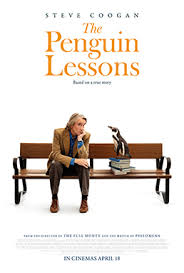
THE PENGUIN LESSONS
UK/Spain, 2024, 111 minutes, Colour.
Steve Coogan, Jonathan Pryce, Julia Fossi, David Herrero, Bjorn Gustafsson, Alfonsina Carroccio.
Directed by Peter Cattaneo.
Films about penguins are always interesting, intriguing, often delightful. 2024 saw the release of My Penguin Friend as well as the Penguin Lessons. Both are set in South America, the former in Brazil, the latter in Argentina. The former is set in the present, the concern for penguins and the environment. The latter is set in 1976.
1976 was a significant year in Argentinian history, civil unrest, the coup by the generals and their continued military dictatorship for the next eight years (including the Falklands War). This is very much the atmosphere of this story. However, the focus is on an Englishman, Tom Michell, the screenplay a fictional adaptation of his memoir (and, as often the case these days, some footage of himself and the penguin during the final credits).
Tom is a teacher, has been drifting for years through the US and Latin America, saddened, isolated, sardonic, not coping with the death of his daughter. He is welcomed by the principal of a privileged high school for the sons of wealthy Argentinians (including generals). The principal is played in a very proper English manner by Jonathan Pryce.
And Tom is played by Steve Coogan, an actor comfortable in both drama and comedy, seen to advantage in the National Theatre Live version of Dr Strangelove where he plays four satiric characters). Here he is rather world-weary, trying to teach his class English language and literature, forced to coach Rugby which he dislikes, intending to coast along in his life and work.
As with any visitor to Buenos Aires, he decides to catch the ferry across the Plata, a visit to Uruguay for some kind of relaxation. Instead, he and a companion from the nightclub, find a penguin covered in oil from a slick. He is happy to abandon it. She wants to clean it, care for it. And, long story short, the penguin becomes his responsibility, getting it through police checks and Customs, concealing it, trying to get rid of it, bringing it back to the school and ensconce it in his apartment.
And, there are many penguin lessons, the penguin becoming in the words of one of the alert students in the class, a metaphor. The penguin, now named, is a hit with the boys, uniting them from their mischief and bullying, paying attention, eager to feed the penguin, its becoming a football mascot.
Interestingly, everybody talks to the penguin, now named Juan Salvador, especially Tom. His rather demanding landlady and her daughter are charmed. His co-teacher from Finland is able to pour out all his personal troubles to the penguin. And, after being initially taken aback, of course, even the principal talks to the penguin. So, happy penguin lessons at the school.
But, this is the year of the coup, the cleaner’s daughter involved in protests, snatched by the police in the street in front of Tom, his not venturing to help, then the disappearance of the shopkeeper who supplied fish to the school, and an episode where Tom with the penguin sees the police chief who headed the abduction, sitting in a cafe, his little daughter patting the penguin, but a severe reprimand for Tom and then his being arrested, interrogated, tortured and released. This atmosphere pervades the latter part of the film.
While there is a happy ending at the school, the boys the better for Tom’s classes and his advocating of social equality and care, and the presence of Juan Salvador, all graduating. And the headmaster decides to use his influence with the parents to obtain the release of the imprisoned cleaner’s daughter.
This is a British film, an adaptation of the memoir, directed by Peter Cataneo (famous for his direction of The Full Monty), some British reserve and reticence as wellais sarcasm and sardonic remarks, which avoids an over-sentimental appeal, but nevertheless has its moments of laughter – and, perhaps to the surprise of some audiences, some tears.
- The title, memoir of the author, based on a true story, fictionalised, the home movie of the penguin during the final credits?
- Argentina, 1976, civil unrest, secret police and arrests, disappearances, the generals, the coup? And its continuing into the mid-1980s? Memories of the Falklands war?
- The city awareness of areas, the school and its interiors, grounds, the city streets, shops, the visit to Uruguay, the countryside, the city? The beaches, the oil slick? The musical score?
- Tom Michel, his story, arriving in Argentina, employed by the school, relationships with the headmaster, various schools in the US and Latin America, age, gradual revelation of the hit run death of his daughter and its effect on him, his wife, loneliness, sarcasm and sardonic, his room in the school, the encounter with the tough housekeeper, meeting Tapio from Finland, his conversations, serious minded, his sad story about his friend and ex-wife?
- The classes, the wealthy students, the fascist backgrounds, taunting the Socialist boy? Disturbances in class? Tom and his classes, sarcasm, Hamlet, literature, John Masefield’s poem, Shelley? Boys and their personalities, presumptions, bullying and targets? The football game, Tom going to lie down, overhearing the conversation between the shopkeeper with the fish and Sofia, reassuring her?
- The decision to go to Uruguay, motives, the trip with Tapio, the bar, the encounter with the women, the dancing, on the beach, finding the penguin, the woman and her compassion, Tom not wanting involvement, back to the hotel, secretly, washing and cleaning it, the kiss, and the woman leaving? The complications with the police and Customs about the penguin, the interrogations, the police threats? Tom bringing the penguin back to the school, in his room, trying to feed it, keeping it on the balcony?
- Audience response to the penguin, the name from Jonathan Livingston Seagull, Tom bringing it to class, the response of the boys, feeding the penguin, behaving better in class, Tom and his getting the boys to lie down, reflect, commentary on the poems, Diego and the focus on metaphor?
- The penguin, in the room, the balcony, with Sofia and her mother, the meal, Tapio and his conversation and revelation to the penguin? And later the headmaster doing the same? Tom and his conversations with the penguin?
- The political situation, lack of freedom, brutality, Sofia’s arrest, the closing down of the fish shop? Tom and Sofia’s arrest, not doing anything, excusing himself to the school, the later confession to Sofia’s mother, with the penguin and seeing the chief of police, his daughter patting the penguin, Tom asking for the release of Sofia, his arrest, torture, release? The reaction of people at the school? The headmaster and his intervention for Sofia? Successful?
- The headmaster, his personality, British, style, colonial? The patronage of the wealthy parents? Closing the school for a week? Suggesting that Tom move on? Talking to the penguin? Change of heart? The boys improving with their studies? The graduation ceremony and the applause for the students?
- Tom, his sad life, the possibility for change, the penguin as reality and metaphor, his staying at the school? And the happiness of Sofia’s release?
- The final information about his staying at the school, return to Wales, finding the old footage?
- The very British sensibility of the characters? Transported from Britain to the uncertainties of the oppression of the generals in Argentina, 1970s-1980s?
Drop

DROP
US, 2025, 95 minutes, Colour.
Meaghann Fahy, Brandon Sklenar, Violett Beane, Jacob Robinson, Reed Diamond, Gabriele Ryan, Jeffery Self.
Directed by Christopher Landon.
Drop is a brief title for a brief, 90 minutes, mystery thriller. In 2024, M. Night Shyamalan had success with a brief title, Trap, tension and suspense in one location. And that is the case with Drop, quite a complex plot, devised by writer-director, Christopher Landon (very successful with the Paranormal Activity series and the two Happy Death Day thrillers).
The film opens with a violent prologue, an abusive husband confront his wife, his death. And then it emerges that the wife is a psychologist, interviewing clients, years passing and almost over the trauma of her husband’s death. She has a young son, entrusts him to her sister as she goes out for a date, a man she had been texting, a rendezvous at an exclusive Chicago restaurant, situated on very high storey (the location for a climactic vertigo-like situation).
Most of the action takes place at the restaurant, Violet, Meaghann Fahey, waiting for her date, in the meantime, some very good cameos to create the atmosphere, from the restaurant’s pianist, the hostess, an oddball waiter on his first job, a lonely older man at the bar waiting for a blind date. Then her date, a photographer, Henry Campbell, Brandon Sklenar, arrives. So far, so ordinary. But, then the drops, DigiDrops, appear on Violet’s phone, increasingly sinister, increasingly mysterious, certainly disturbing for Violet and, audience empathising, disturbing for the audience as well.
A reviewer has to resist the temptation of elaborating on plot details. No spoilers. Suffice to say for review that there are quite a lot of twists, the realisation that the drops are originating in the restaurant itself, that there is surveillance going on, that not only is Violet being targeted, but also her date.
There will be a final revelation, the identity of who is sending the drops, the complex motivation in Violet’s response, using her wits to turn the tables. That vertigo -like climax.
And there is further drama with the discovery of masked gunmen at Violet’s home, threatening her sister and son, a second dramatic climax.
Whether this is realistic or not, whether the plot entirely make sense, is not the point. It is the immersing of the audience in this 90 minutes of tension.
- Drop, the tag for the communications, the impact on Violet? The momentum of the drama?
- The opening in the mood, the violence, women targeted, Violet and her fear, her husband and his viciousness, the baby? Setting the tone? The later reprisal of the scene, Violet blamed for killing her husband, his taunts, his killing himself?
- Violet and her work as a counsellor, her client, the techniques, the importance of self-image and confidence? For Violet herself?
- Her sister, encouraging her, the scenes with Toby, the toy truck (and its being crucial to the climax)? Jen and her comments on Violet’s dresses and make up? Violet and the correspondence with Henry over the months?
- The glimpse of Chicago at night, the buildings, the lights? The restaurant, the clientele, the bar, her nervousness, having the drink, the encounter with Richard, his age, smiles, nervous, his date and her arrival? Henry arriving? The table, the meeting, the hopes for the date?
- The Drop experience, the messages on the phone, and her concern about Toby? The messages coming through, her reaction, showing Henry, taking the issue lightly? The continued messages, the technique of displaying them right across the screen rather than close-ups of the phone?
- The pressure on Violet, her fears, the threats to Toby and Jen, Violet and growing anxiety, the change of table, going to the restroom? The issue of spiking the drink? Her being watched? The technology and its having to come from within the restaurant? Cara and her friendliness at the bar, conversation, support, the issue of the drinks, violet surreptitious with the poison? Getting the drinks, Henry going to the bar? His drinking?
- Violet and her looking at the suspects, sinister-looking men, then their dates arriving, the pianist, the comic interludes with the earnest waiter? The tension?
- Richard, his date leaving, his smiles, his approaching Violet, the revelation of the truth, Henry as a star witness, the target for killing? Richard and his taunting of Violet? The phone, the killer, the camera in the home?
- Violet turning the tables, talking with Richard, his dessert, her poisoning him? The gun, the anxiety of the guests, the struggle, the shooting of the window, the draft dragging him out, his death? Dragging Violet out the window, Henry pulling her in?
- The violence, Henry being wounded, Cara being wounded? Violet leaving, the desperate drive in the car, the traffic, in the house, the killer, masked, the threats, Jen and her tactics, being shot? The risk to Toby? Violet in the house, the confrontations, the violence, the toy truck and the gun, Violet shooting?
- The visit to the hospital, Jen and hospital care, and the bonding with Henry?
Once Around the Sun
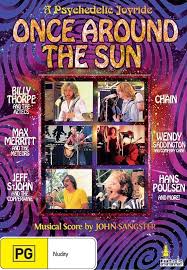
ONCE AROUND THE SUN
Australia, 2012, 75 minutes, colour.
Directed by David Huggett.
Five months after the famous rock concert at Woodstock, August 1969, there was an Australian festival and remember. Michael Wadleigh made by the acclaimed film of Woodstock. There was filming at remember but the documentary did not eventuate, lack of finance. Then the material disappeared, later recovered and restored.
21st-century audiences, it is an opportunity to see and hear some of the noted singers, bands and groups of the period, in the rock music style of the time.
However, it is an extraordinary psychedelic film, one might say more than extraordinary animation, continued throughout the film, a cosmic and evolutionary visual opening to John Sangster score, and then the performances of their being framed by the same style of animation, sometimes over the performers themselves. The impact is more than striking.
There is an excellent background, explanation, review from Bernard Hemingway.
From the Cinephilia site (https://www.cinephilia.net.au/show_review.php?movieid=5221): Bernard Hemingway
Australia’s first ever open-air rock music festival held at Ourimbah, north of Sydney over the Australia Day Weekend in January 1970, was much like Woodstock, just as Once Around the Sun is very much like Michael Wadleigh’s concert film of the same name. The resemblances are less to do with slavish imitation (Woodstock was held in August 1969 and the film released in March 1970) than with the unifying strength of the flower-power zeitgeist that briefly gripped Western youth for a brief while at the end of the 60s.
Originally filmed by Gordon Mutch, a Sydney sculptor and experimental filmmaker, the intention was to document the new Antipodean Age of Aquarius in a impressionistic manner but the project, which included an original score by John Sangster, collapsed because of lack of financial backing. It remained lost for forty years until staff at Australia’s National Film and Sound Archive discovered both the original film and Sangster’s score which have now been combined and re-edited into "a psychedelic joyride", to quote the promotional poster.
Although it is a pity that there are no interviews with any of the tripped-out festival attendees which would have lent it real vernacular flavour and instead we get a sanctimonious vocie-over from Adrian Rawlins, a kind of Down-Under Allen Ginsberg figure of the times, Once Around The Sun is nevertheless a valuable record of a time and place. Structured around the performances and mixing footage of the audience with psychedelic interludes combining intensely coloured patterns over Sangster’s score, it is a showcase of what was considered to be the bee’s knees at the time in art and fashion.
Compared to Woodstock the music is unsophisticated if not downright crude and dominated by the prog rock sensibility that reigned at the time. This is demonstrated by Billy Thorpe’s version of “Season Of The Witch: but above all by arch-hippy band, Tully. Other big name performers of the time include Jeff St John and Copperwine, Wendy Saddington, Chain, Max Merritt, Australia’s own version of John Sebastian, Hans Poulsen, with New Zealand ex-patriate, Leo De Castro in the only straightforward rock number, a Jerry Lee Lewis cover.
If you are of the generation and want to travel back in time or you want to see what your parents, or even grandparents, were up to when they were your age it won’t come any better than Once Around The Sun.
Death Race 4: Beyond Anarchy
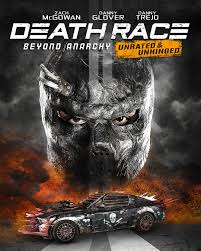
DEATH RACE 4: BEYOND ANARCHY
US, D 18, 109 minutes, Colour.
Zach McGowan, Danny Glover.
Directed by Don Michael Paul.
What happens beyond anarchy? Annihilation? Or, the possibility of salvation?
As can be seen from the title, there have been three Death Race films. They are futuristic, and grim world, fast cars, reckless drivers, injuries and deaths along the route, and champions in an ugly world.
This particular version certainly presents an ugly world, dark, black, a world of the bleakest of territories, prison, with a death races take place. This particular prison is ruled by a warlord, Frankenstein, always masked.
However, there are glimpses of a more ordinary world, fashionable and luxurious living, and the playing of politics and power. And, on the outside of the prison, clubs where bookmakers have contacts with the political world as well is the dark world, would have big betting.
This film is actually won an award – Best stunts. Which means that in its written atmosphere, in the vicious races, drivers both men and women, masked, tattooed, liver… Weapons… Its appeal is to fans of this kind of film. Many audiences will find it far too much.
Eventually, something of the plot does emerge, a champion driver delivered by helicopter along with a female driver, their involvement in the races, confrontation with Frankenstein, and the revelation that the champion driver is actually being parachuted in by the government to defeat Frankenstein and then to be rescued. A lot of the complications with various driver characters, support, betrayals, a seedy club in the hostess in a relationship with the champion, her being taken hostage, to be rescued…
Zach McGowan is the champion and it is a surprise to see Danny Glover in such a prominent role, a controller of the races. And any trio appears as a master bookmaker.
The scenario was written by Tony Julio, a prolific writer of such stories, working with the director, Don Michael Paul, himself an actor and action director. And the collaboration is with British Paul W.S.Anderson who directed the 2008 death race action film.
This is Joan Collins
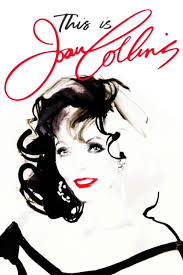
THIS IS JOAN COLLINS
UK, 2022, 96 minutes, Colour.
Directed by Clare Beavan.
This entertainingly comprehensive portrait of actress and celebrity, Joan Collins, was released in the year that she turned 89. She collaborated with the venture, appearing continually throughout the film, discussions about lighting and positions, reading a text, at the microphone, commenting, and some wry expressions and smiles about what she was viewing.
The film is informative on several levels. It provides an overall sketch of Joan Collins’ family, early upbringing and influences, training, moved to films, to Hollywood, marriages and divorces, relationships, ups and downs of her career, her children, American television, returning to the stage.
It also provides an overview of her career, her hopes and ambitions, training, the move to film in Britain, the invitation to Hollywood, the seven-year contract with 20th Century Fox, her early films like Land of the Pharaohs, Girl in the Red Velvet Swing, MGM, The Opposite Sex, lesser films, comment on actor she worked with, fairly derogatory on Richard Burton and Sea Wife, the diminishing of her film career, and the beginning of relationships with actors like Warren Beatty and break ups, and her regret for turning down the role in Sons and Lovers. There were her lean years, in television shows like The Virginian, horror films in England and The Empire of the Ants. And, then, dynasty and their identifying with Alexis Carrington, her popularity in the media, magazine covers and articles, television interviews. There was also her relationship with her sister, Jackie, in the background of filming The Stud and The Beach. And some details of her career, television and stage work in the 21st-century.
The film is very personal also on her relationships, her husband’s. With scenes from Maxwell reads films, there is the ugly story of date rape, her disillusionment, the marriage at 17, his wanting to prostitute her to an Arab millionaire, the divorce proceedings and his demand for alimony. There follows the marriage with Anthony newly, his growing celebrity at the time, that children, his deceiving her, the divorce, amicable. There is the marriage to the entrepreneur, Ray, a child, an affluent life and the discovery that it was built on deceptions, especially in finance. There is the surprise of the marriage to Peter home, the Swedish singer, his on-screen charm, and the realities of his persona in the real life of the marriage. Finally, there is a long time marriage to Clark Gibson, Collins finally setting and settling down.
The other aspect of interest in the film is in its portrait of Hollywood film making and the Hollywood culture from the 1950s to the 1990s, the glamour of the studios and contracts, the failing of the studios, the way prim celebrities were promoted and exploited, the emergence of television and its popularity. There is the life of the 50s, exploitations by producers like Darrell Zanuck, and Collins meeting with Marilyn Munro and her conversations, the covering up of relationships and harassment. Then there is a mood of the swinging 60s, the difficulties of the 1970s, the transition to television and television movies and exploitation films. Then, the 80s, the popular television series, the rivalry between Dallas and dynasty, the emergence of dynasty over nine years and its place in American consciousness, Joan Collins herself liking the 1980s and reminding audiences that it was the green decade, with reference to Gordon gecko and Wall Street.
There is quite an amount of material to be considered here, not necessarily in-depth exploration of some audiences might want, but an interesting and entertaining overview in just over 90 minutes.
Sinners
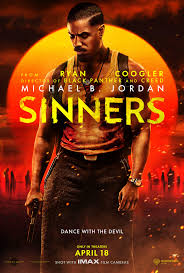
SINNERS
US, 2025, 137 minutes, Colour.
Michael B. Jordan, Miles Caton, Jack O'Connell, Helena Hua, Yao, Sam Malone, Delroy Lindo, Jayme Lawson, Hailee Steinfeld, Wunmi Mosaku, Omar Benson Miller, Buddy Guy.
Directed by Ryan Coogler.
To judge the sinners, it is important to know what the sins are. And, in this very striking and surprising drama by Ryan Coogler, there is quite a range of sinners.
Once upon a time, 2013, first time feature film director, Coogler, made a small budget film with Michael B. Jordan, Fruitvale Station. It focused on the police shooting of a young black man, highlighting racist issues, which received quite some critical acclaim. Coogler has collaborated with Jordan on the two spin-offs from Rocky, Creed, as well as two blockbusters in the Marvel Universe, Black Panther. Now he collaborates once again, big budget, long running time, with Jordan – twice.
Twice in the sense that Jordan here plays twins, two young men from a Mississippi town who went off to World War I, returned to prohibition Chicago, heavily involved in criminal activity, Sinners, to say the least. But, it is 1932, they return to their home town, buy an old mill from a racist owner, want to set up a jazz juke joint, especially for the African-American population of the town. And, this is what the first part of this film focuses on, the brothers, making all their contacts, hiring musicians, contracting friends to work, and the personal dramas from their past, past relationships.
While Jordan plays identical twins, the screenplay is something of a twins’ screenplay itself, to interrelated stories, but not identical twins. The second part of Sinners involves quite a different range of sins and sinners.
The film opens with the religious dimension, a talented young musician, Sam (a striking performance by Miles Caton) comes into his father’s church, the father is suspicious of the devil’s music, trying to reconcile with his son. And then the screenplay goes back 24 hours to the first part already described. With all the publicity, but a surprise to those who saw the film without warning, most audiences will now know that this is a vampire film, an Irish vampire (Jack O’Connell), roaming the West, pursued by Native Americans, but controlling and transforming the victims.
Then they converge on the mill, a siege, singing and dancing to Irish music, the contrast with the jazz at the mill, some eerie confrontations and conflicts, and an all-out battle with the vampires. And then back to the opening sequence of Sam at the church.
This is an original story, screenplay, full of the unexpected, but drawing on all kinds of movie traditions, jazz musicals, the vampire stories. Quite overwhelming in its way.
There is quite an important development set in the 1990s during the final credits which early exiters will regret that they have missed. And, further alert, right at the end of the credits there is a song sung by Sammy, calming and helping the audience to leave the cinema and reflect on what they have seen and felt.
- Sinners? The range of sins? The range of sinners? Victims of sinners, exploitation, vengeance, forgiveness…?
- The work of Ryan Coogler, his writing skills, his directing skills, African-American issues?
- The theme of twins, identical twins? The film’s twin themes of music and song, but not identical twins?
- The opening, traditions of music, supernatural elements, African, American cultures? Tone of the prologue, Sam, his injuries, guitar, entering the church, his father’s reaction, the choir, the congregation, his father’s warning, embrace, music and the influence of Satan, his father’s exhortation?
- The transition to 1932, Mississippi, the cotton fields, the town, African Americans, the slave heritage? The flashback for the one day, the action taking place over 25 hours? The audience immersion in the life of the Mississippi town?
- The twins, Michael B.Jordan’s performance as each, similar, contrast? The arrival back in town, the varying reactions of people, memories, their involvement in the war and this experience, later with Smoke and the weapons? The Chicago background, Al Capone, gangsters, taking the money, taking the Irish beer, the car, their ambitions, going to the mill, the encounter with the boss, his smile and dismissal of the Klan, paying the money? And the irony of later seeing the man, his white henchman, the racism, the attack, Smoke bringing out the weapons, the confrontation with the leader, asking for a smoke, shooting him? Sinners and judgement?
- The plan, the truck with the goods, meeting with Sam, Sam as a character, his age, skill with music, playing the guitar, singing, Stoke and’s admiration? In the town, meeting with Delta Slim, their playing together, the crowds? His gaze on Pearline, the conversation with her, married, invitation to the evening?
- Stack, his personality, relationship with Smoke, mutual protection, working together, the promotion of the venue? The encounter with Mary, the discussion, the relationship in the past, her passing for white, his awkwardness, the death of her mother, the burial?
- Smoke, going to the cotton fields, the encounter with Cornbread, his work, his pregnant wife, the money, going along with the group, pleased, being the bouncer?
- Smoke, visit to Anna, her personality, echoes of voodoo and beliefs, sexual relationship, the later memories by Smoke of the baby? Her agreeing to help?
- The Chinese, the store, the young Jessica, watching, her father and enthusiasm, his wife and her strong mindedness, the helping with the cooking?
- The crowds gathering, the music, the plan, Sam, Delta Slim and his enthusiasm, piano, mouth organ, Pearline and her performance? Zest, enthusiasm of the crowd?
- The introduction of the vampire theme, Remmic, his arrival, his fears, the couple and their reaction, letting him in, the arrival of the Indians, the warning about him and the violence? Vampire, their being transformed? The going to the dance, not allowed in, the plausible story, the Irish and white tradition, wanting to be part of the African-American experience? The confrontation at the door? The singing, then moving away?
- The vampire experience, Mary going out, the confrontation, possessed, going back, the sexual encounter with Stack, her attack on him? His response, Smoke’s response?
- The atmosphere of fear, the crowds, trying to escape, Cornbread and his going out in the field, confrontation, transformed, his return? The plausibility of those possessed, their talk, and their knowledge of everybody else’s life? Stack, his joining the group, coming back, trying to be persuasive, with Mary?
- The small group inside, the garlic, Chinese couple, the man going to get the car, transformed? The threat to their daughter?
- The plausibility of Remmic, his talk, songs, the couple and their backing him up?
- The attack, the fights, the stakes, destroying the vampires? Anna and her self-sacrifice? Delta Slim and his sacrifice?
- The sun coming up, Remmic and the others caught in the sunlight? Sam, the guitar, being urged to go back home?
- Smoke, getting the guns, lying in wait, the attack of the racists, the confrontation, shooting? His own wounds? Memories of Anna and the baby?
- Sam, his return to the church, the repeat of the opening, his decision, leaving, the religious perspective, the race perspective, the issue of freedom?
- The surprise interlude during the credits, 1992, Chicago, Sam as an old man, the visit from Mary and Stack, looking and sounding like the 1990s, the discussion with him, his singing, their offering to transform to live for eternity? His turning them down?
- In the post-credits sequence, Sam and his singing, the young Sam, his experiences on that day, but his life before him, the audience finishing this film with song and music?
Count of Monte Cristo/ 2025
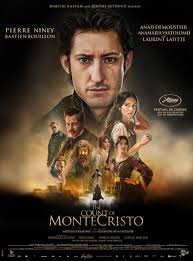
THE COUNT OF MONTE CRISTO
France, 2024, 178 minutes, Colour.
Pierre Niney, Bastien Bouillon, Anais Demoustier, Anamaria Vartolomei, Laurent Lafitte, Pierfrancesco Favino, Patrick Mille, Vasdsili Schneider, Julien De Saint Jean, Julie De Bona, Adele Simphal, Stephane Varupenne, Marie Narbonne, Bruno Raffaelli.
Directed by Alexandre de La Patellière, Matthieu Delaporte.
The novels of Alexandre Dumas have been very popular since the 1840s. French history – The Three Musketeers, the Man in the Iron Mask, The Count of Monte Cristo. And, they have provided a great deal of entertainment on the big screen and on the small screen. The Wikipedia entry on the novel lists 25 film versions all films, even in imaginary sequels, which derive from the plot and even more television versions.
The novel gets full attention in this version. It runs for almost 3 hours. And, it can be described as “lavishly-mounted” which covers the visual style of settings and sets, costumes and decor, 19th century atmosphere. And, this time, it is a French version, a national version of a national treasure.
Audiences remembering previous versions, this reviewer remembering Robert Donat, Richard Chamberlain, Jim Caviezel, the injustices that fall on the central hero, Edmund Dantes, especially, his imprisonment on the island, Chateau D’If, near Marseille. The long years that he spent isolated in prison, the tunnelling, his contact with Abbe, Faria the Abbe instructing him, bequeathing him the treasures of Monte Cristo, but no abating the sense of vengeance and revenge. And, then, his escape.
This time Edmond Dantes is played by French actor, Pierre Niney, who has been building a successful career in a variety of roles but who now successfully embodies the complexities of the Count of Monte Cristo. Interestingly, the role of the Abbe Faria is played by very popular Italian actor, Pierfrancesco Favino, most convincing in this role.
However, in this version, all this action takes place in the first hour. It was something of a surprise to find two hours spent on Edmond Dantes and his voyage to Monte Cristo, the treasure, his new identity, his place in the world and the response to this mystery celebrity. Even though the film is long, a lot of the action takes place off screen, the screenplay suddenly moving five years or more in advance, the audience having to fill in their response to the changes in the Count.
But, for the drama, his establishing himself, the long quest for revenge, his activities in the meantime, his international travels, his contacts, there is a huge supporting cast. There is the opening sequence of his rescue of the Napoleonic spy from the sea, his humble family background, the accusations against him, the betrayals. And these characters, years older, quite complex stories in their own right, become the targets of his plotting, manipulations, violent revenge, impoverishment of rivals, deaths.
And, as with the other versions, there are some swashbuckling sequences and swordfights. But, ultimately, the novel and the film versions do raise the perennial and important question from the Gospels, “what does it profit to gain the whole world but to lose one’s soul?”.
- The long popularity of the novel, the historical novels of Alexandre Dumas? The many film versions, television series, imaginative sequels, stories based on the plot – especially unjust imprisonment, escapes, vengeance?
- A lavish 21st-century production? Period, atmosphere, costumes and decor, buildings, mansions, interiors? Courts, jails, the Château d’If? Sequences at sea? The rescue? The isle of Monte Cristo? The treasures?
- The length of the film, audience emersion in the period, the characters and issues?
- The opening, the sea and the ships, in the sea, Dantes and his rescuing of the young woman, the reaction of the Captain, his anger? Meeting with the company owner, his dismissal of the captain, his promotion of Dantes, the identity of the woman, Napoleonic spy?
- Dantes, return home, reunion with his father, his father as a servant (and the later grief at the news of his father’s death), the aristocratic family, the conversation, his love for Mercedes, the friendship with Fernand? The wedding, the interruption, his being arrested, Mercedes lived at the altar?
- The interrogation, the role of the hill fort, the ship’s captain, the owner of the shipping company, Fernand, Danglars and his associate, listening in, Fernand giving up Dantes for the family’s name? Dantes taken away, the imprisonment?
- Four years passing, Dantes alone in his cell, the grating at the top, the roll call for “Living”? His suffering, the appearance? Stone moving, the contact with Abbe Faria? The tunnelling continuing, the discussions, Faria offering to teach Dantes everything, languages, maths, philosophy, history? 10 more years passing, the tunnelling, the saltwater, the collapse, the injuries to Faria, and his explanation of the Knights Templar, the treasures, the island of Monte Cristo? Faria dying, the preparations for his body to be thrown overboard? Dantes, substituting himself, the discovery of the empty cell, his being thrown into the sea, escaping from the canvas, swimming to safety?
- Monte Cristo, the steps, the mausoleum, opening it, the dark and the torch, the vast depths, the discovery of the treasure?
- The screenplay and the passing of time, months, years? The later dialogue filling in what happened to Dantes, his emergence as the Count of Monte Cristo? His buying the mansions, the setup and decor, affluence? His identity? (And his disguising himself as a priest and confronting Danglars’ associate, getting the truth from him, later appearing, to get absolution, and leading his band of thugs?)
- Dantes and his personality, the past experience, the imprisonment, his travels, and the news that Mercedes had married Fernand? A son? His bitterness, wanting vengeance, coldly calculating and planning?
- His finding the woman he rescued, her story about her brother, his mistress pregnant, the birth, de Villefort burying the baby, her rescuing it, bringing him up, going to the institution? Dantes and his visit, meeting Andre, taking him away, the years passing, his educating him, part of his plan? The revelation Andre about his father?
- Haydee, her story, the war, Dantes finding her, her father, the role of Fernand, losing his eye, but killing her father, her being part of Dantes’s plan?
- The stage robbery, Andre, being pursued by Albert, the thugs, Dantes and the rescue of the boy, restoring him to his family, their gratitude? And the assailants all getting up after their performance?
- Meeting Fernand, meeting Mercedes, his reaction, judging her for not waiting? Her suspicions of his identity? Their further meetings, tactics and wordplay? Ultimately, the revelation of the truth, her knowing who he was, her pleading for her son, her story about his loving him, his producing the document of Fernand’s betrayal?
- Danglar5s, his prosperity, fleet, slavery, organised human trafficking in Marseilles, his involvement, his marrying de Villefort’s mistress, their daughter? His self-confidence?
- The various socials, entertaining, Dantes and his being feted? The story of Lord Halifax, ultimately Dantes masking himself, literally, as Halifax, the interview with de Villefort? His psychological manoeuvres? The newspaper, Impartial, and the stories of Danglars’ fleet and disappearance, the reassurance, Danglars and his finance, confident of putting all his hopes in Dantes’s money?
- The romances, Albert and Haydee, Dantes forbidding it, yet their meeting, the romance? Andre, and his attentions to Danglars. daughter, and the fact that she was his half sister?
- Dinner, at the Château where Andre was born and buried? Dantes and his way of telling the story, the guests listening, and Danglars interested, the threat to de Villefort?
- In court, Andre and his previous masquerade as the Spanish count, credibility, rehearsing his lines with Dantes? Exposing the truth, the exposure of his father? And his later arrest? Danglars and the realisation of the truth, Dantes and his self-revelation?
- Albert, his love for Haydee, her love for him, urging him to go? Defying Dantes, the glove, the duel? Mercedes and her pleading for her son? The duel, Dantes shooting away? His return, Haydee and her upset, denouncing him, her love for Albert, his being in the coach, emerging, Dantes urging them to run away to their future?
- The confrontation with Fernand, the duel, swords and knives, injuries, Dantes and his surviving? Mercedes and her leaving her husband?
- The moral issues, the issue of the innocent victim, punishment, torture? The transition to vengeance, literally gaining the whole world, Dantes losing his soul, the possibility of forgiveness, and the final words of:
Wilding
WILDING
UK, 2023, 75 minutes, Colour.
Directed by David Allen.
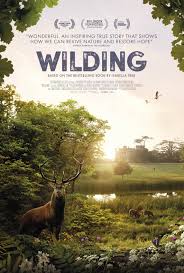
To complement David Attenborough's Ocean, there is another British documentary, Wilding, which is solidly land and Earth-based. It is based on a book by Isabella Tree, an environmental story, an experiment, over more than 15 years in south-eastern England. While there is some footage of the actual environmentalists, actors portray the couple in the present, presenting a first-person commentary on the Wilding, re-Wilding of their property.
The film focuses on a couple inheriting a country estate, practically a castle, and wider grounds. However, they discover the earth is tired, making the point that when soil loses its nutrients, it becomes merely, dirt. With reference to a number of experimenters on revitalising earth and soil, they begin an experiment, with some hostile reactions from neighbours, with slow evaluation and cooperation by government authorities.
The advice they receive is to introduce some wild horses, other animals, revitalising the life of trees, waterways (especially with extraordinary beavers), over long years with hopes and disappointments, the revitalising of flora and fauna, the return of so many animals and birds, returning landscapes to what they were like hundred years ago. It is visually exciting as well as encouraging.
Until Dawn
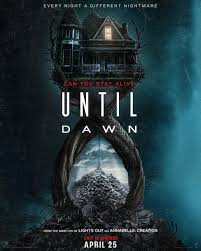
UNTIL DAWN
US, 2025, 103 minutes, Colour.
Ella Ruben, Michael Cimino, Odessa A'zion, Ji-young Yoo, Belmont Cameli, Maia Mitchell, Peter Storemare..
Directed by David F.Sandberg.
An often grim and gory horror film. Audiences watching this film will be reminded of Groundhog Day, except that this is a Groundhog Night story, repetition after repetition, but starting at night, the audience seeing an hourglass, the sand running through, then starting anew.
But, the idea here is that a character goes to sleep and wakes up the next morning. This time, however, the characters die, often brutally, sometimes in pieces, smashed, but, there they are, starting again each night.
In fact, the film begins with a young woman, night, crawling through the grass, trying to escape a vengeful pursuer – but failing, executed. Her sister, depressed, some suicide attempts, gathers her friends together to find and rescue her disappeared sister. On the way, they meet the storekeeper in the isolated town who gives them directions, their driving through a mysterious mist, exiting to find an old mansion – and the film does give an explanation of how this mysterious place came to be.
Enjoyment of the film will depend on how well the audience relates to each of the characters, sometimes sympathetic, often irritating, and even more frequently behaving erratically. No wonder, because they know are each night they are going to die again, trying to prevent it and failing, clashes with each other…
Until Dawn is a PlayStation production, the film version of a popular computer game. And, in computer games, every setting is possible, rapid change of settings possible, living, dying, living again are all possible parts of the game. So, not to be taken too literally, and, of course, expecting the unexpected as the players try to defy the odds.
There is a revelation as to who is behind all the mayhem, a mad psychologist who appears finally, and a challenge then for the group, or survivors, at least, to confront him.
A horror film for those who like to observe – game-players would prefer to be actually playing rather than watching.
(The director, and David F.Sandberg, is Swedish that has made a number of American films, one of the Annabelle thrillers as well as the two Shazam films.)
Inside Man: Most Wanted
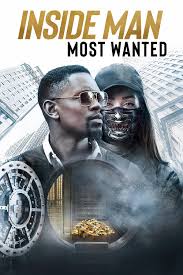
INSIDE MAN: MOST WANTED
US, 2019, 105 minutes, Colour.
Aml Ameen, Rhea Seehorn, Roxanne McKee, Akshay Kumar, Andre Jacobs.
Directed by M.J.Bassett.
Inside Man was a very successful thriller in 1996, directed, unexpectedly, because of his social comedies and critiques, by Spike Lee. And it had a star cast, a very clever screenplay, the bank robbery, negotiations, and sleight of hand in deceptions.
This film takes up the same story, with particular references to the original characters, a photo of Denzel Washington, some of Clive Owen, the Nazi gold, robberies, planning, deceptions. The film is a star vehicle for British actor, Aml Ameen, and for Rhea Seehorn (from Better Call Saul). They are the two negotiators odd couple, she very serious, he with continual patter, when the Federal Reserve is being robbed, the Nazi gold, and complex motivation is.
The film as enjoyable as a heist film even without reference to the original film (many bloggers finding this sequel an insult to their revered original).
Direction is by M.J.Bassett, English director. She moved to the US and directed a number of films and television series.
- The status of the original? This film is sequel, references to the original robbery, negotiation, planning and success? A repeat of the process?
- The prologue, World War II, the Americans, the discovery of the Nazi gold? Audience knowledge of the gold and the robbery from the previous film?
- The New York settings, the city, police precincts, the University lecturer, the Federal Reserve, the interiors, the gold? The surveillance? The musical score?
- Remi, in action, the patient at the hospital, sweet-talking him, success? His record? Breezy character, talking, New Orleans background?
- Brynn, her lecture, the students, the interruption, task? Her principles, saving hostages? The authorities, issue of promotion? And she has her assistant, research?
- The focus on Arielle, to the bank, the planting of the team, the customers, the takeover, the guns, letting the staff go, the hostages, putting on red gear and masks, indistinguishable? The plan, her command, the gold, military, the bars like brass, the drilling for the escape, Joseph, his brutality, killings? Josie and her assisting Arielle? The later revelation of the motivation, the connection with the original film, her brother and the planning, his being captured, killed? The sister as student in New York, her relationship with Bobby, giving the information, the underground, her pretending to be beaten, her disappearance?
- Brynn, Remi, together, becoming a team, the staff, technology, surveillance, the phones? The different personalities, working together? The contact from Arielle, wanting Brynn? The conversations, the water and the hostages getting it, Jimmy and his patter, discerning the story, interpreting Arielle? Brynn, the hostages, her decision to go in, in the cage, the conversation with Arielle?
- The plan, the timing, the threats, the arguments, the plane and the vehicles, the escape plan? Drilling through the wall? Joseph killing the driller?
- The SWAT team, the attack without authorisation, being rejected? Their being ready, snipers?
- The character of Sam, the police, collaboration with the Ruby?
- The explosions, the water coming in, Arielle under the water, then on the roof, Joseph being trapped, getting out, the attack on bringing, Remi and the rescue? Her getting out?
- The cleaning up, the realisation that the gold was turned into bars, the information about the contents of the draw in the bank, Hamlet, Ava’s disappearance?
- The setup, the background of the neo-Nazis, the club in Berlin, Chase, her brother as prisoner, the rendezvous with Brynn? The discussions, the arguments, the arrival of the police, her success, at first refuse promotion, possible promotion? And going off for a coffee with Remi?
- The finale, Arielle, going to the club in Berlin…?